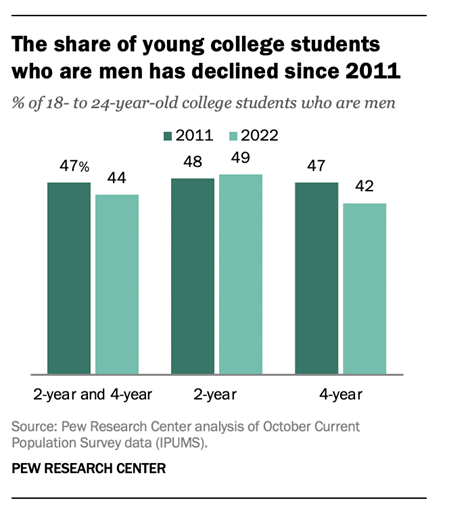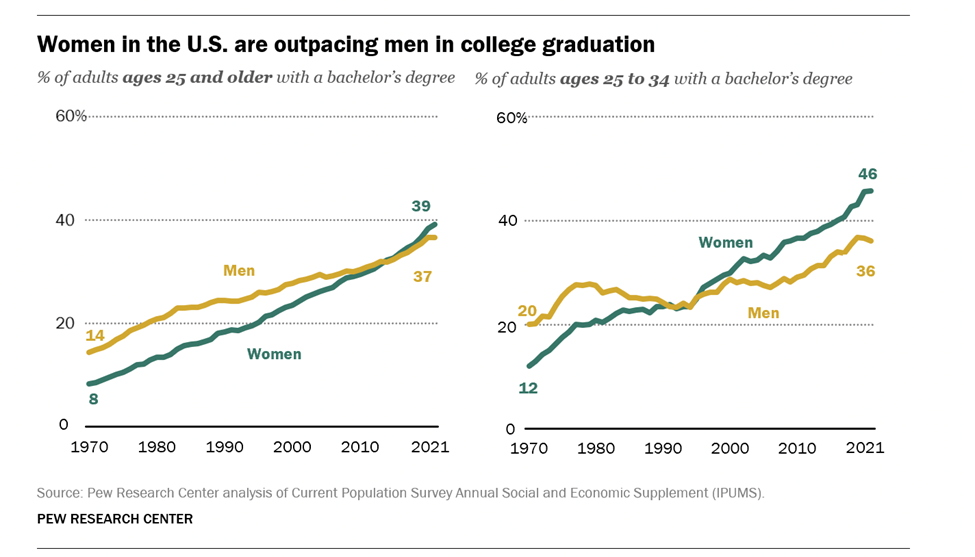In the ongoing discourse surrounding workplace dynamics, a critical and often underestimated challenge has come to light – the rising number of young men exhibiting hesitancy to enter or withdrawing entirely from the workforce.
While the spotlight on workplace diversity and inclusion is undeniably in flux, it is imperative to direct our attention to the unique hurdles faced by young men. This silent struggle carries profound implications for individuals, businesses, and society at large.
A substantial portion of young men grapple with obstacles hindering their entry into the workforce or prompting premature disengagement. This predicament is rooted in various factors, including societal expectations, mental health concerns, and evolving gender roles.
What Does the Data Say?
Recent data from the National Bureau of Economic Research underscores the severity of the issue, revealing a consistent decline in the labor force participation rate for young men over the past few decades.
The proportion of prime-age men not participating in the labor force has risen for decades, from 5.8% in 1976 to 11.4% in 2022. When the Baby Boom generation was prime age, only 7% of males at age 25 were not in the workforce. Today, that number has doubled.
Beyond workforce participation, the decline in the enrollment of young men in higher education adds another layer to the challenge.
The latest research from Pew Research Center highlights a significant drop in college enrollment among young men, indicating a broader societal shift that extends beyond the workplace.
The graph below shows the decline of men enrolling into college, yet women's numbers are going up (the following graph). It is great to see more women enrolling into college, but I can’t help but wonder how this difference might be impacting overall gender roles in society and deeper societal concerns.


This can have a significant impact on society and businesses. Economically, it poses a risk of losing skilled labor, which can impede innovation and hinder overall growth.
From a societal perspective, this trend may contribute to heightened rates of mental health issues, social isolation, and a pervasive sense of purposelessness.
The phenomenon of young men disengaging from the workforce can lead to identity crises, adversely affecting their overall well-being. Societal expectations for men to fulfill traditional provider roles can exacerbate internal conflicts when faced with challenges, potentially resulting in a generation grappling with unfulfilled potential and unrealized aspirations.
Addressing the Needs of Young Men
Recognizing and addressing the challenges faced by young men in the workforce is vital for fostering a more inclusive and supportive environment in the same way it does for any other group.
This goes beyond superficial discussions on diversity and inclusivity, delving into the intricate factors contributing to this silent struggle.
Fewer men pursuing graduate studies means they aren’t keeping pace with women in becoming more qualified for higher-level roles.
While the increase of women participating in the workforce is undoubtedly a good thing, it is also seeing a growing trend of men becoming stay-at-home dads as women take on the role of breadwinner for the household.
This, however, is not a signal that overall women are earning more, because in most cases men still earn more than women across industries. In this family dynamic, the household is actually earning less overall.
More broadly, relationship dynamics are shifting and will ultimately cause a major cultural shift. The percentage of men between ages 25-40 who find themselves earning less than their female counterparts in a relationship is increasing year to year.
According to another recent Pew Research Center study on earnings of men and women in a single-family household:
Far fewer husbands are the sole breadwinner in their marriage these days. The share of marriages where the husband is the primary or sole breadwinner has fallen steadily in recent decades, driven mainly by the declining share of marriages where the husband is the sole provider – this was the arrangement in 49% of marriages in 1972, while today that share is 23%.
Pew Research Center study
Although men still outnumber women as sole breadwinners, the percentage of women who are breadwinners is rising from 5% in 1972 to 16% in 2023.
Looking at other societal factors, the increasing prevalence of substance addiction among young men poses significant risks, particularly amidst societal and economic challenges.
As more men grapple with addiction to substances, alcohol, and medication, they often find themselves in a downward spiral of social isolation, compounded by mental health obstacles and unhealthy coping mechanisms.
This reliance on substances not only exacerbates mental health struggles but also perpetuates a cycle of dependency, leaving many men feeling trapped and without viable avenues for support.
In a climate where layoffs and unemployment are not uncommon, men of all education levels are facing heightened uncertainty about their future and questioning their sense of worth and purpose. This combination of addiction, mental health issues, and economic instability underscores the urgent need for targeted interventions and support systems tailored to the unique challenges faced by men.
It's imperative that we, as a society (employers, educators, government), address these issues holistically, offering comprehensive resources and pathways to recovery, while also addressing broader societal factors that contribute to this alarming trend. Only through concerted efforts can we stem the tide of addiction and provide men with the support and opportunities they need to thrive.
Businesses can play a pivotal role by implementing targeted strategies for mentorship, and mental health support, and cultivating a culture that encourages open dialogue about these challenges.
Companies prioritizing the well-being and professional development of their male employees contribute not only to a more compassionate workplace but also to a healthier society.
If you're looking for a tech solution to employee wellness challenges, there are a number of employee wellness platforms that can help you develop a holistic wellness approach.
A Better Way Forward, Together
To address the challenges faced by men in the workforce, it's crucial to promote open dialogue and awareness. By fostering discussions about men's experiences and breaking down stereotypes, we can cultivate empathy and understanding.
Additionally, implementing supportive policies such as flexible work arrangements, parental leave policies, and mental health resources can significantly contribute to men's well-being and career advancement.
It is also essential to remember that as we construct such benefit packages in our organizations, we need to ensure that husbands of female employees have equitable access to resources and support.
By extending benefits to spouses, organizations acknowledge the vital role that family plays in an employee's well-being and success. Moreover, communicating this message within the organizational culture fosters a sense of inclusivity and support, reinforcing the understanding that these benefits are not just for the employee, but for their entire family unit.
Cultivating a culture of inclusivity from the top-down fosters an environment where all individuals, regardless of gender, feel empowered and supported to thrive in their careers.
Collaboration among employers, policymakers, and educators is crucial in creating a workforce environment that supports all individuals, irrespective of gender, in navigating the challenges they may encounter.
In the pursuit of a thriving and diverse workforce, let's ensure that no voice is left unheard, including the voices of men – which seems to have been forgotten in recent times.
If you want to keep up on the latest workforce trends and hear from experts how they're overcoming the latest challenges in HR and people operations, subscribe to the People Managing People newsletter.

